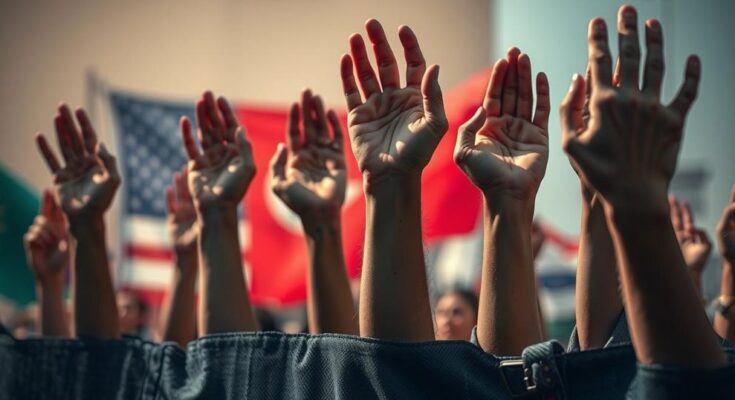About 40 individuals were arrested in northern Nigeria for displaying Russian flags during protests against the rising cost of living. The protests, ongoing for six days, led to at least seven fatalities and more than 700 arrests. Army Chief Christopher Musa warned against flying foreign flags, emphasizing it as a treasonous act. These developments reflect growing dissatisfaction with President Bola Tinubu’s policies and broader socio-political shifts in the region.
In northern Nigeria, approximately 40 individuals were apprehended for displaying the Russian flag during protests against rising living costs and perceived government inadequacies. This crackdown follows warnings from army chief Christopher Musa regarding the treasonous nature of flying foreign flags. The protests, which have spanned six days nationwide, have resulted in seven fatalities and over 700 arrests, with demonstrators expressing discontent with the economy and governance.
Among the protest slogans, some demonstrators have shown affinity for Russian President Vladimir Putin, urging Moscow for assistance. Critics observe this phenomenon as an attempt to diminish any burgeoning pro-Russia sentiment in Nigeria, a significant oil producer allied with the West. Following military coups in nearby West African nations, public discontent has shifted towards countries perceived as having failed to address security and economic challenges, resulting in a notable decline in support for Western-backed governments.
President Bola Tinubu, who took office in May 2023, faces widespread dissatisfaction, attributed largely to his policies that followed the removal of a longstanding fuel subsidy, which triggered rampant inflation of essential goods. He has asked Nigerians to exercise patience for improvement while meeting with security officials to strategize on handling ongoing protests.
In light of the protests, Musa issued a stern warning against the display of foreign flags, stating, “We will not accept anybody, any individual flying any foreign flag in Nigeria. That is a treasonable offence.” The Russian embassy, meanwhile, has distanced itself from the protests, emphasizing non-interference in Nigeria’s domestic matters.
In Kaduna, law enforcement arrested 39 individuals, including a tailor who was creating Russian flags. Over 40 Russian flags and a single Chinese flag were seized, and a curfew has been imposed in Kaduna, affecting millions. Nigeria’s secret service has also apprehended tailors in Kano for fabricating Russian flags, indicating a broader investigation into sponsors of the protests. Rights organization Amnesty International reported that at least 13 people have died since the protests began and condemned the excessive use of force by security personnel.
President Tinubu addressed the nation, reiterating commitment to addressing protester concerns but noted that certain protests have devolved into vandalism. He advocated for dialogue as a means to resolve current unrest and restore order.
The recent protests in Nigeria highlight a growing dissatisfaction with rising living costs and government performance. Following President Bola Tinubu’s administration’s controversial economic measures, including the removal of a fuel subsidy, public discontent has surged. This unrest has coincided with a notable increase in pro-Russia sentiment, particularly as neighboring West African nations have shifted allegiances towards Moscow amidst growing unhappiness with traditional Western influences. The situation is emblematic of broader regional tensions and shifts in political alliances.
The arrests of approximately 40 individuals for waving Russian flags during ongoing protests in Nigeria underscore significant discontent regarding economic conditions and governance. This crackdown is indicative of a larger trend of dissatisfaction with the Tinubu administration, particularly following recent economic reforms. As protests continue, the government’s response highlights the precarious balance between addressing public grievances and maintaining political stability amid increasing support for foreign influences like Russia.
Original Source: www.bbc.com




